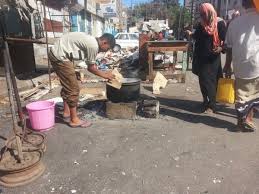Can You Imagine Lifestyle and Hardships of Life in Aden?
YemenExtra
SH.A.
In October 2017, I departed on vacation from Amman to Yemen. When I arrived in Aden, I was extremely shocked from the moment I stepped into the airport lobby. I was taken aback by the poor services and the stunningly peculiar treatment. There was an unfamiliar culture that didn’t exist before. For example, one was now forced to pay a bribe to expedite procedures and get an entry stamp instead of standing with a crowd of people to wait in a long queue.
Aden International Airport, once known for its quick services and proper treatment, had now become one of the most unfortunate airports, needing urgent redevelopment and service enhancement. The air-conditioning system was malfunctioning. Airport employees and porters were swarming all over the place, rushing around to get tips from passengers who had heavy bags. The luggage claim area was a cramped hall. It was nearly impossible to stay near the luggage carousel to see the baggage emerge.
We waited one hour for our luggage to come although our flight was the only one that day. The culture of having to pay tips emerged once more; airport workers have a monopoly over the luggage cart and so to get a cart, one had to tip a worker!
I stepped out of the airport terminal yearning to see my father’s face and my brothers. Nobody was there for me! I phoned them, and they told me that civilians are not allowed to enter the airport without security passes. Do the kind people of the peaceful city of Aden need security passes to enter their city airport? Why? Apparently, security passes are among the new measures taken to prevent terrorist attacks. Military personnel are stationed outside the airport. They conduct security checks of passengers using traditional methods without the benefit of modern technology. However, they cannot provide adequate safety and protection to arriving or departing passengers.
The airport was the first sign of the major changes my country had gone through in the last years of conflict. On my way to my family’s house, I wondered what had happened to my city and the impact of the war on the houses and streets, even on the faces of the city’s residents. I felt so sad when I saw that services in my city were now worse than those in a village. War had corrupted all the beautiful things Aden used to offer. On one side, there was a long queue of vehicles waiting to get fuel, a common scene in all parts of Yemen nowadays as Aden deals with gas shortages.
In addition to the enormous decline in food supply, thousands of government employees complain that their salaries have not been paid for nearly 20 months because of Yemen’s financial distress. The purchasing power of Yemeni people has decreased due to the enormous rise in prices, and especially in the prices of food due in part to high import costs.
Electric services in Aden are interrupted. The city lives in darkness. Electricity is provided for a few hours in summer during the very hot weather where temperatures reach, on average, 40 degrees Celsius. Citizens are in dire need of alternative energy generators which require fuel that is only available in insufficient quantities at outrageous prices.
Water is not available anymore in many residential neighborhoods. Even when water is supplied, it’s not available on a daily basis, and there are frequent interruptions that last for days. Moreover, not a single drop of public water reaches many key areas in the city. Can you imagine the unhealthy lifestyle and hardships of life without regular water supplies?
As for jobs, there are no opportunities in the city, in addition to the lack of resources needed for salaried employees. I remember one scene that is never far from my thoughts: a group of elderly people and retirees sitting around in a circle for long hours under the burning sun waiting to receive their pensions. A friend told me that her elderly neighbor spent a long time standing in line to receive his salary, but died of a heart attack before reaching the counter.
These are just a few of the dire circumstances and major changes I have witnessed. I get emotional talking about my city – a place that used to be known as the “smiling face of Yemen.” During my visit, I didn’t see any smiles on the faces of residents. All I hope is to return one day to my beautiful city rebuilt completely and the sadness turned to joy in the hearts of its vulnerable and disadvantaged people.
Source: Website.

